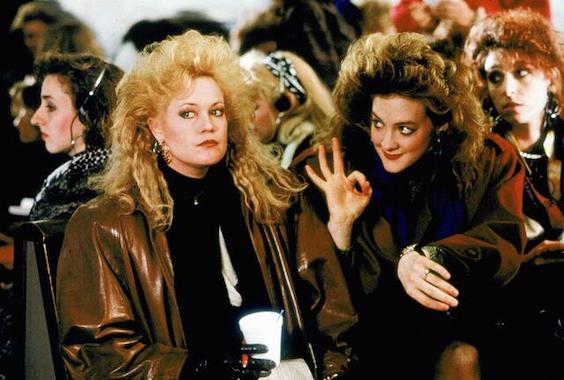For some people, setting boundaries is black and white. For others, those boundaries get a bit grey. For example, what would you do if your boss stole your idea and claimed it as their own? Would you sit back to keep the peace (and save your job) or would you speak up (and risk losing it)? Where do you draw the line?
The Line in the Sand
Thats what happened to Tess McGill from Working Girl. While her boss is out of the office with a broken leg, Tess stands up for herself in a most unexpected way. She pretends to be the boss! She convinces a new client that her idea, the one her boss tried to steal, is a winner and she lands their account. By the time they figure out she is not who she said she is, she has already proven herself to be a creative, dedicated businesswoman.
Instead of losing everything, she gets a bigger and better job at the client’s company.
Who doesn’t love a good Cinderella story, especially when a woman breaks the glass ceiling? Tess was made to feel inferior based on how she looked and how much money she made. She was invisible even though she was a visionary, treated as if her ideas didn’t matter. When the opportunity to share those ideas came up, she did what she had to do to be heard.
Crossing Boundaries
Did Tess overstep her bounds? You bet. Was she wrong? Again, yes. There were certainly other ways to get what she wanted. She did not follow the rules of engagement, but then again, neither did her boss. That said, you cannot turn to whataboutism to justify bad actions. No matter how you look at it, Tess’s behavior was unethical — she lied to her co-workers and the associates at the firm, even if she fessed up afterward.
This does not mean women should not stand up for themselves. Damn right they should! Imagine a world where Harriet Tubman didn’t establish the Underground Railroad. Susan B. Anthony did not fight for a woman’s right to vote. Rosa Parks stayed at the back of the bus. Mother Teresa did not sacrifice for the poor. Malala Yousafzai did not speak up against the Taliban. Sometimes, you have to overstep what society expects of you so you can make a meaningful change in the world.
Tess McGill may not have exactly been a beacon for women’s rights but she changed her own world for the better. Many women, men too, will want that for themselves. The question is when is it okay to overstep those boundaries and stretch your limits. When do the ends justify the means?
Stretching Your Limits
It is all about your values. What you say should reflect your values, what you do even more so. If you wouldn’t respect someone for doing what you are about to do, why would you do it yourself?
Tess is nothing if not true to herself. She’s not content to sit back and let life pass her by. Despite the obstacles in her way, perhaps even because of them, she puts it all on the line for a chance to “make it”, consequences be damned. You can see it on her face when she settles into her office in the film’s final scene.
She assumes she will be working as a secretary until it is revealed that the woman she assumes to be her boss is actually her secretary. How the tables have turned! Even so, Tess stands by her value system. Unlike her old conniving monster of a boss, she treats her secretary as a colleague, as a partner. Never forget where you came from.
Alice Baxter: Maybe now would be a good time to go over what you expect of me.
Working Girl (1988)
Tess McGill: I expect you to call me Tess. I don’t expect you to fetch me coffee unless you’re getting some for yourself. And the rest we’ll just make up as we go along.
It’s okay to step out of line sometimes and show some grit. You only grow when you stretch your limits. So long as you try not to hurt anyone in the process (and hopefully don’t break any laws!), spread those wings and fly.


Leave a Reply